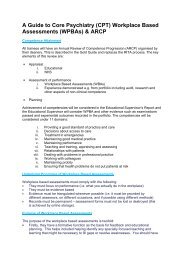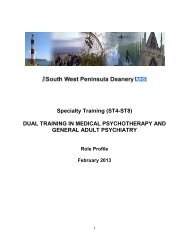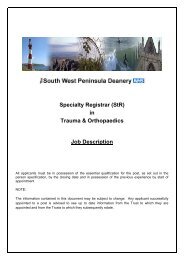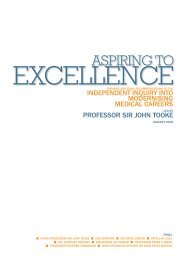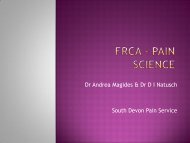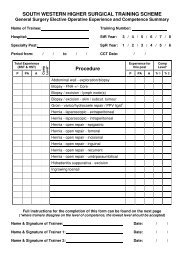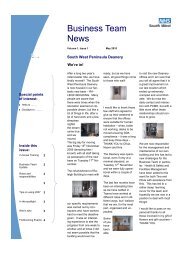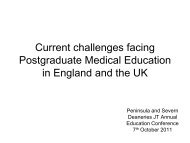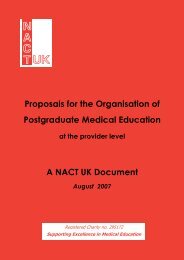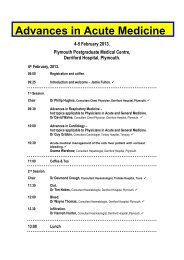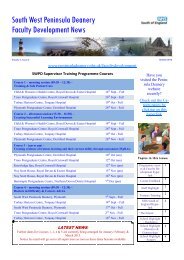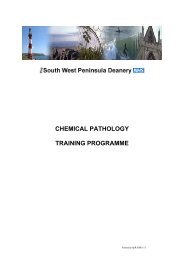Acute Medicine â South West Peninsula Trainee Case Study
Acute Medicine â South West Peninsula Trainee Case Study
Acute Medicine â South West Peninsula Trainee Case Study
You also want an ePaper? Increase the reach of your titles
YUMPU automatically turns print PDFs into web optimized ePapers that Google loves.
<strong>South</strong> <strong>West</strong> <strong>Peninsula</strong> Deanery<br />
Career Planning Service<br />
<strong>Acute</strong> <strong>Medicine</strong> – <strong>South</strong> <strong>West</strong> <strong>Peninsula</strong> <strong>Trainee</strong> <strong>Case</strong> <strong>Study</strong><br />
Dr Juline Smit – <strong>Acute</strong> <strong>Medicine</strong> SpR – September 2008<br />
Your background prior to studying medicine<br />
I went to medical school straight from school.<br />
The reason for choosing <strong>Acute</strong> <strong>Medicine</strong><br />
Whilst at medical school I had various ideas of what I might want to go into, however it was<br />
only after finishing medical school and started working that I decided. I had always felt<br />
inclined to do medicine over surgery, and it was my experience working in many different<br />
areas of medicine which confirmed my choice of eventual acute medicine.<br />
I decided to do acute medicine as it is the only specialty involved in true general medicine.<br />
All other specialties have become extremely specialised whereas acute medicine covers a<br />
bit of everything. Some people like going into great detail into certain areas, however general<br />
physicians deal with such a huge variety and cover all sort of topics. As it is a relatively new<br />
specialty – it is only in the last two years it has become recognised - it is an exciting and<br />
developing area to work in. Hopefully as it develops further we will become even better at<br />
treating and managing the acutely ill patients.<br />
The training involved in becoming a consultant is hard and long, therefore it is important to<br />
find your niche and find something that you really enjoy and are motivated to do.<br />
The reality of working in <strong>Acute</strong> <strong>Medicine</strong> as a trainee doctor<br />
The environment of acute medicine is quite stressful. There is rarely a point where it is not<br />
busy as it is admitting 24 hours a day. On other wards things often calm down after the ward<br />
round, however this is not the case on a medical assessment unit. You do need to be careful<br />
as it could be easy to burn out.<br />
As it is a new specialty and constantly developing you need to be able to cope well with<br />
change and instability.<br />
In my opinion the best part of this specialty is the excitement and the challenge of the work.<br />
On other wards, the patient would have already been seen and would have quite a stable<br />
diagnosis and you would largely be sorting out the minor details. In acute medicine you are<br />
involved at the very early stage and this is exciting. The first 48 hours of admission are often<br />
the most crucial for patients. You are given the job of initially managing the patient, working<br />
out the correct diagnosis and to a certain extent you are a ‘detective’ in their condition. Even<br />
as a junior doctor you are drawn into the heart of things as they are happening.<br />
The job is incredibly varied which I love and I love the atmosphere of constantly learning and<br />
keeping up to date with new developments. The broad spectrum of the work means that it is<br />
easy (and encouraged) to specialise in another area of interest to you. You are not set in<br />
stone like other areas and instead can tailor your subspecialty to your own diverse interests<br />
e.g. ICU, chest medicine etc.<br />
Updated_August2009<br />
I:\Careers Planning\Careers Information\A-Z Careers Information Sheets\<strong>Acute</strong> <strong>Medicine</strong>\approved by<br />
Cate\<strong>Acute</strong>_<strong>Medicine</strong>_<strong>Trainee</strong>_<strong>Case</strong>_<strong>Study</strong>_August_2009_Final_Version.docx Page 1
Daily activities and responsibilities<br />
We usually start the day with a ward round to see all the patients admitted overnight. We do<br />
an initial assessment of prioritising patients who are particularly unwell, and then we see the<br />
others. We all work closely in the team to ensure that investigations and tests are followed<br />
up and the treatment plans are followed through. I supervise the junior doctors and other<br />
staff within the department. I also work one day on call overseeing all the medical<br />
admissions and taking GP referrals for admission.<br />
Suggestions for personal development and managing change<br />
I think that it is important that if you are considering a career in acute medicine that you work<br />
at least 4-6 months on a medical ward before deciding on the specialty, as your perception<br />
can be markedly different to the reality and it is vital that you are sure of your choice.<br />
It is important that you have good communication skills. The team work closely together and<br />
therefore if you prefer to work individually this would not be a suitable career choice. In this<br />
job you need to be able to think on your feet and function well under pressure. Excellent time<br />
management skills and prioritising tasks are vital.<br />
Ways to achieve a successful work-life balance<br />
I think that it is important to develop other interests outside of your day to day work. I have<br />
developed a sub-specialty interest and started doing more teaching which gives me a short<br />
break from the ward work. To relax I enjoy yoga and the arts.<br />
Snapshot of your career path to date<br />
My training has been slightly different, in that I did my medical training in <strong>South</strong> Africa which<br />
is six years. I worked in <strong>South</strong> Africa for three years after qualifying before coming to the UK.<br />
I came to the UK and did a medical rotation in Plymouth for three years. I then worked in<br />
Plymouth before starting as a trainee registrar in <strong>Acute</strong> <strong>Medicine</strong>. My training has been<br />
longer than the normal training route, however I don’t regret this. Even now as a registrar I<br />
still feel like a junior and I think that my additional years of experience in the different areas<br />
of medicine gives me greater confidence in what is a very difficult and testing job.<br />
Career goals for the future<br />
In addition to my ST training, I am also training in cardiac ECHOs and will be sitting the BSE<br />
(British Society of Echocardiography) examination, in order to train to the standard of a<br />
cardiac technician. I hope eventually I will be able to run an outpatient cardiac ECHO list<br />
once a week.<br />
I really enjoy teaching and like the environment of working with the medical student and<br />
junior doctors. I hope to continue to love clinical medicine and do more teaching.<br />
I will qualify as a consultant in acute medicine in 2011. At present it is daunting to be head of<br />
a unit, as the consultant effectively manages the entire unit, hopefully as the specialty gets<br />
more recognised these duties will be more structured.<br />
Updated_August2009<br />
I:\Careers Planning\Careers Information\A-Z Careers Information Sheets\<strong>Acute</strong> <strong>Medicine</strong>\approved by<br />
Cate\<strong>Acute</strong>_<strong>Medicine</strong>_<strong>Trainee</strong>_<strong>Case</strong>_<strong>Study</strong>_August_2009_Final_Version.docx Page 2



